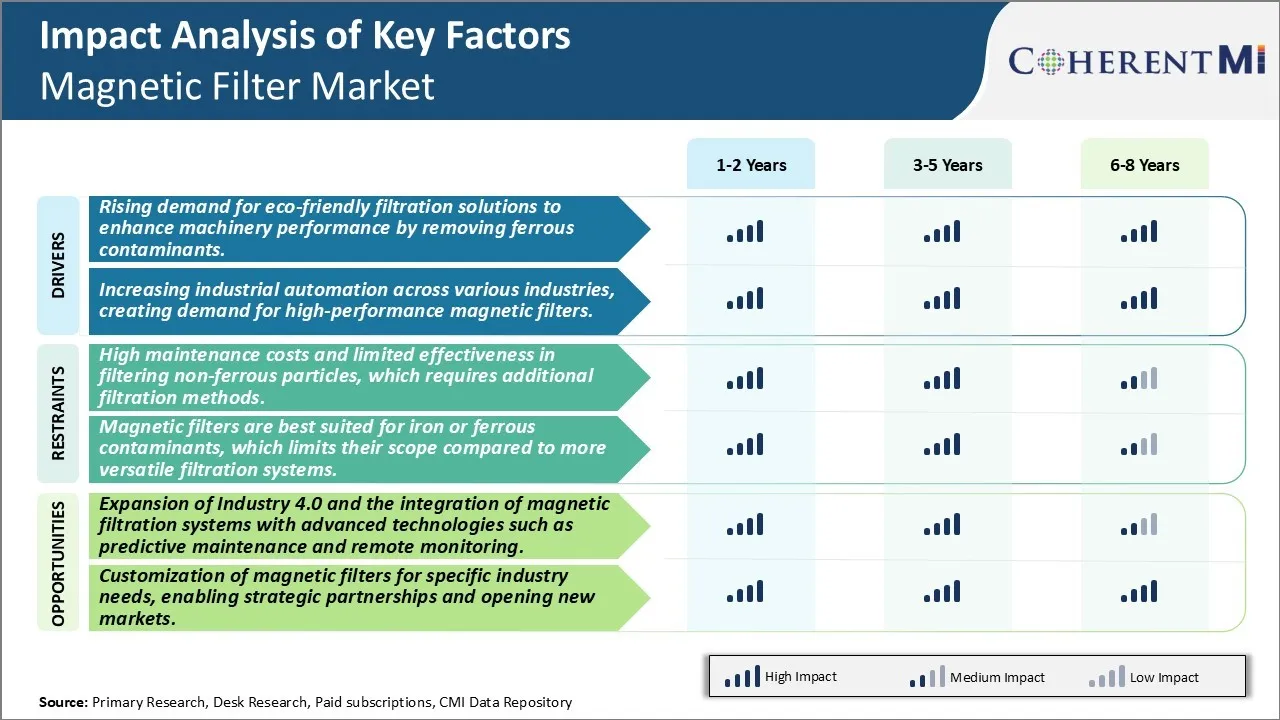Magnetic Filter Market Trends
Market Driver - Rising Demand for Eco-Friendly Filtration Solutions to Enhance Machinery Performance by Removing Ferrous Contaminants
There has been a growing focus on sustainability and use of eco-friendly products across industries in recent years. Manufacturing companies are under increasing pressure from regulators as well as customers to reduce environmental footprint of their operations. One of the areas that is drawing attention is machine maintenance and extending lifespan of equipment by preventing premature failure and breakdown. Traditional filtration methods use disposable filters that end up in landfills adding to non-biodegradable waste. Magnetic filters offer a green solution as they are reusable and provide long lasting protection to machinery.
Magnetically separating tramp metal particles from hydraulic fluids, lubricating oils or other industrial liquids ensures smooth operations without risk of expensive repairs from metal debris inside valves or motors. This improves overall equipment effectiveness while reducing downtime costs. As companies focus on cutting costs through efficiency improvements as well as protecting the planet, magnetic filtration is emerging as an attractive technology. Leading industrial firms have deployed magnetic filters across their production plants globally to deliver performance benefits as well as sustainability gains. Magnets help retaining iron and steel contaminants for long durations without requiring frequent replacements.
Another advantage is that magnetically cleaned fluids can be reused multiple times before final disposal, lowering overall consumption of fresh fluids. This translates to substantial savings in material procurement spend. Magnetic filters also eliminate hazardous waste generation from disposed chemical-based cartridge filters. Growing ‘mission-critical’ nature of industrial operations is elevating importance of reliability which magnetic filtration assures at attractive life cycle costs. With stricter environmental regulations on the anvil worldwide, demand for eco-friendly magnetic separation solutions enabling cleaner manufacturing is likely to continue rising significantly.
Market Driver - Increasing Industrial Automation Across Industries Drives Industry Growth
Advanced technologies like robotics, artificial intelligence, internet of things are transforming industrial landscape at a rapid pace. Automation is increasingly becoming necessity for manufacturers across sectors to keep up with rising consumer expectations of quality, efficiency and product customization. However, industry 4.0 comes with its own set of challenges around maintaining highly sophisticated automated machinery and equipment operating for 24/7. Even minute metal particles or impurities can damage precision mechanics causing costly disruptions.
Traditional filtration practices may not provide assurances required for seamless operations of advanced robotics on the plant floor. Magnetic filters have emerged as a reliable solution catering to stringent quality demands of automated production environments. Their unique mechanism ensures ultra-fine filtration of problematic ferro-magnetic contaminants without any interruptions. This maintains critical fluid cleanliness within tight specifications needed for complex automated machinery. Robots, conveyors, programmable logic controllers and other computer-controlled systems have brought paradigm shift in how manufacturing units function today.
But this progress also increases vulnerability to unexpected breakdowns hampering throughputs. Magnetic filtration accurately warding off potential failures helps maximize equipment uptime important for time-bound automated workflows. As automated systems continue to proliferate across food processing, automotive, electronics and other vital industries, demand is surging for protective filtration maintaining performance of sensitive components. Magnetic filters are playing a key role in mission-critical industrial automation projects by guaranteeing reliable fluid filtering required for hassle-free 24/7 operations of automated assets. Their rising importance is steering healthy growth of global magnetic filter market.

Market Challenge - High Maintenance Costs and Limited Effectiveness in Filtering Non-Ferrous Particles, With Additional Filtration Methods
The magnetic filter market faces ongoing challenges related to the high maintenance costs associated with these systems. Magnetic filters require periodic cleaning and replacement of magnetic filter cartridges or magnetic rods in order to maintain optimal performance levels over time. The buildup of trapped ferrous particles on the magnetic surfaces reduces their ability to attract and remove such contaminants from fluid systems. This necessitates routine cleaning and imposes additional labor expenses. Moreover, magnetic filters alone have limited effectiveness when it comes to filtering out non-ferrous particles such as aluminum, copper, and non-metallic debris. To address this issue, most operators employ complementary filtration methods like filter presses, centrifuges or screen baskets to remove these contaminants - further raising overall maintenance costs. Single-use filtration technologies or advanced magnetic filter designs with lower-maintenance coatings could help address this challenge and boost adoption.
Market Opportunity- Expansion of Industry 4.0 And the Integration of Magnetic Filtration Systems with Advanced Technologies
The growing expansion of Industry 4.0 concepts and technologies presents a major opportunity for the magnetic filter market. Industry 4.0 utilizes smart sensors, cloud computing, data analytics and the IoT (Internet of Things) to drive greater connectivity and automation in industrial applications. Magnetic filter manufacturers can leverage these advances by integrating predictive maintenance capabilities, remote monitoring functions as well as automated cleaning cycles into their systems. This allows operators to more proactively address maintenance needs based on real-time performance data. It also enables remote oversight and management of magnetic filters without the need for on-site inspection. When integrated with advanced technologies, magnetic filtration solutions can deliver improved efficiency, higher uptime and reduced servicing costs for end-users. The adoption of Industry 4.0 principles thus provides a platform for magnetic filters to enhance their value proposition and boost demand going forward.